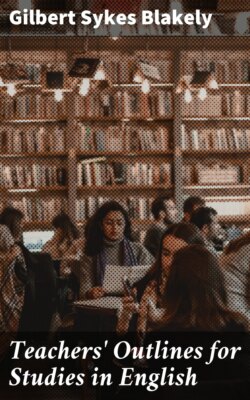Читать книгу Teachers' Outlines for Studies in English - Gilbert Sykes Blakely - Страница 11
На сайте Литреса книга снята с продажи.
III. Study of the Book as a Whole
ОглавлениеSetting and Situation.—Find five or six references in the story that throw light on the time when the events are supposed to have taken place. (See customs of travel in Chapter III, of dress in IV and XII and of the punishment of criminals in XXX and XXXI.) Draw as definite a conclusion as you can from these references, and be prepared to defend it.
Where is Wakefield? Do we know whether the places described are English or French or Irish? Give reasons.
Could the scene have been laid in some other country or some other century without radically changing the story? What alterations would be necessary?
What do we learn from this book about customs in dress? means of travelling? education? other customs?
Plot.—How long a time is involved from the beginning to the end of the story?
At what point did you discover the identity of Mr. Burchell? Could you have discovered it earlier if you had read more closely?
Are there frequent surprises, or do events occur as we expect them to?
Are all the events probable? Has the author succeeded in making them seem probable?
Is the plot simple or complex? How many chapters are used to introduce the story? What is the climax?
Is there, as in Ivanhoe, a series of scenes closely connected? Are there incidents that might have been omitted as superfluous? If so, would the story have been more, or less, interesting without them?
How far does Mr. Burchell influence events? How far does Mr. Jenkinson influence them? Squire Thornhill?
Characters.—Does the author make us acquainted with the various characters by what he says of them; or by what they say and do themselves; or by what they say of one another; or by all of these methods? Examine Chapters I, III, VII, and XI.
Is the Vicar a man of intelligence? of sincerity? of good judgment? Name his chief traits. Would he command our respect if he were our neighbor? Account for the fact that people have been charmed with his character ever since the book was written.
Do the characters seem true to life? Do they remain the same kind of persons from first to last, or do they show development?
Contrast the Vicar and his wife; Olivia and Sophia; Squire Thornhill and Sir William.
Interpretation.—The writer of a historical novel aims to give a vivid picture of certain dramatic events in history. The writer of a novel of life and manners usually has some ideal of life or character, more or less clearly defined, that he endeavors to picture. Try to frame a statement of some truth the Vicar's life may fairly be said to illustrate which seems to you the central idea of the story.
Method of Narration.—Who tells the story?
Would the effect have been essentially different if someone else had told it, perhaps Mrs. Primrose, or the author himself?
Does the narrator speak from the standpoint of one who somehow or other knows all that the characters do and think and feel, or of one who recounts merely what he himself feels and sees and hears? Compare with Ivanhoe in this respect.
To what extent does the author use dialogue?
Style.—Is there any attempt to use dialect?
Do the characters talk as we should expect them to talk, or do they all talk like the author?
Note a few passages that express humor; some that express pathos. Find a few descriptions that present vividly a scene of beauty. Are the sentences easy and natural, or formal and dignified?
The Life and Character of the Author.—What do we know of Goldsmith's childhood? his family? his education? his professional training? his travels? his friends in London? his literary enterprises?
What can you find in the experiences and character of Dr. Primrose, of Mr. Burchell, or of George Primrose to suggest Goldsmith's own experiences and character, or those of his father?
What characteristics of Goldsmith do you think you have a right to infer from this story? Give reasons.
Comparison.—Does the charm of this novel lie in the setting? in the plot? in the characters? in the style? in the lesson it teaches? or in all of these factors together?
Compare this book, topic by topic, with Ivanhoe or with some other novel recently studied.
